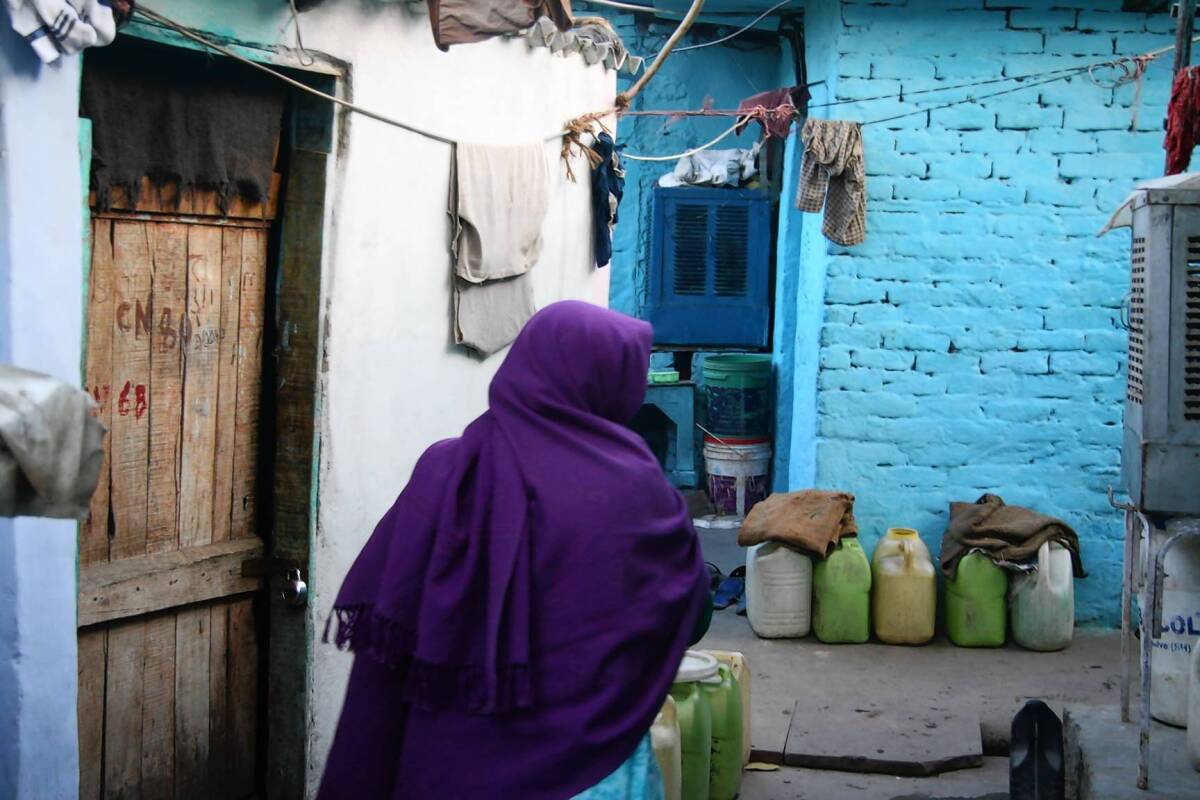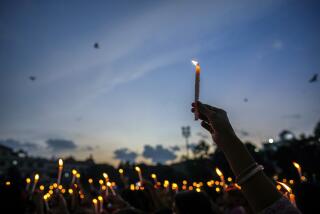India rape suspects’ neighbors feel stain of infamy

- Share via
NEW DELHI — They were the boys next door. A bit rough perhaps, a bit rude, prone to wasting money on cheap booze probably brewed in a backroom tub. But who dreamed they could be capable of something like this?
A few miles from South Delhi’s posh “farmhouse” estates, this part of the R.K. Puram neighborhood was just another slum until mid-December, when a brutal rape awakened a nation long inured to the mistreatment of women.
News crews soon traced four of the six alleged attackers to this community. Satellite vans blocked the unpaved road to grab their 20-second bits and bites, fueling national outrage among a middle class that drives past the slum, ignoring beggars tap-tapping on the tinted windows of its imported cars.
In no time, a coating of infamy settled over R.K. Puram, thicker than the polluted dust falling from the sky.
Neighborly reticence soon gave way to the lure of a few minutes of fame, a bit part in something bigger than this life of hard work and nagging doubts about whether the city and the gods will favor a transplanted villager. Heads peeked from doors spaced inches apart to volunteer a detail, a shading about former residents turned national pariahs.
People recalled past brushes with their four infamous neighbors, trying to understand what could have motivated them to commit the crime they’re accused of. Some remarked on how the 23-year-old woman with a bright future, her identity protected but nicknamed Brave Heart, had a background not too different from that of the suspects. And how she went to a movie in a posh mall in mid-December with a 28-year-old male friend, and boarded a bus to return home.
Most here have never been to a mall, and they could never afford its cinemas. But they’ve been on many such buses. They imagine the pair realizing that this was no ordinary commuter bus as the doors shut, curtains were drawn and the nightmare began. The assailants reportedly posed as passengers before beating the pair with a metal rod and raping her, leaving her intestines barely intact. The woman died two weeks later in a Singapore hospital.
R.K. Puram is one of numerous destinations for the river of migrants with cheap plastic luggage arriving each day from villages, looking to trade the slow life and petty bickering for a few square feet of hovel and a shot at a dream. It comes down to luck, said tuk-tuk driver Chandrakesh Kumar, who wants to own a table and chair someday, maybe even a car. Those are aspirations the countryside doesn’t abide.
Since the attack, residents said, R.K. Puram’s reputation has been tarnished. Business student Deepak Kumar, 17, dreads the raised eyebrows and probing questions from prospective employers after he mentions his address. One bad fish can dirty the pond, agrees homemaker Somvati, 45, who uses one name.
Heavier still is the burden on relatives of the rape suspects. Trying to fight the tide of scorn, to argue that blood is thicker than newsprint, is a losing battle.
A woman named Asha showed off her house, each of its two rooms barely larger than a double bed, its garish but magical purple lights highlighting the altar to elephant god Ganesh that her electrician husband made. Next door is the locked house of her now-imprisoned cousins, Mukesh and Ram Singh, who are accused of trading off driving duties to take turns raping the victim.
Asha said the two had long shown disrespect for women, and once gave her husband a beating. A few days ago, a third Singh brother showed up after drinking too much, residents said, threatening to torch the neighborhood for not siding with his brothers. The father arrived later, conceding that his sons should be punished, amid rumors of the family’s association with black magic.
The Singh brothers, bus drivers by trade, deserve what they get, many residents said. It’s likely that two other suspects, fruit seller Pawan Gupta and gym instructor Vinay Sharma, were dragged along by the others, they said. But if they had qualms, they should have fled and called the police, many insisted.
Sharma told his mother from prison that he had tried to leave but that the others threatened to kill him, residents said as they debated the line between evil and terribly bad judgment, a distinction of little interest to a nation bent on retribution.
In narrow lanes where women and children bustle to fill plastic containers at a solitary water tap, the fading winter light sent shards across a one-room house that sleeps six — now five — where frayed clothes and battered school bags hang on nails. Three children with dirty faces said they missed Sharma, their jailed brother, and could not believe he’d do such a thing. The gym instructor faces life behind bars, even the gallows, for a night out with the wrong crowd.
The five adult suspects who face charges of murder, gang rape, evidence destruction and criminal conspiracy have entered not-guilty pleas in their fast-track trial. A sixth suspect is to be tried in juvenile court.
This weekend, in response to public outrage, India pushed through laws that significantly increase the punishment for stalking, voyeurism, stripping a woman or carrying out an acid attack, and allow the death penalty for rapes that leave victims in a “persistent vegetative state.”
Women in R.K. Puram and across Delhi say they feel more vulnerable since the attack.
Lakshmi Devi, 50, repeatedly calls her shop assistant daughter whenever she works late; Somvati avoids public places; Meena Kumari, 40, is shipping her 17-year-old daughter back to the village. It’s not possible to protect her, she said, and five growing children in one room is increasingly unmanageable as Delhi’s ever-rising prices make it tougher to make ends meet. She loves Delhi, she said, but it’s taken part of her heart.
The question of society’s inhumanity hovers above it all: Thousands of passersby ignored the victims after they had been thrown like empty soda bottles from the bus, half dead. Tuk-tuk driver Kumar said he would have driven past as well, worried that lazy, corrupt police would pin the blame on him after he helped, as happened to a friend. His heart says yes but his brain says no, he added.
Others believe they would have helped, even as they acknowledge that they were probably less callous back in the village, before they were changed by life in the big city.
More to Read
Sign up for Essential California
The most important California stories and recommendations in your inbox every morning.
You may occasionally receive promotional content from the Los Angeles Times.










